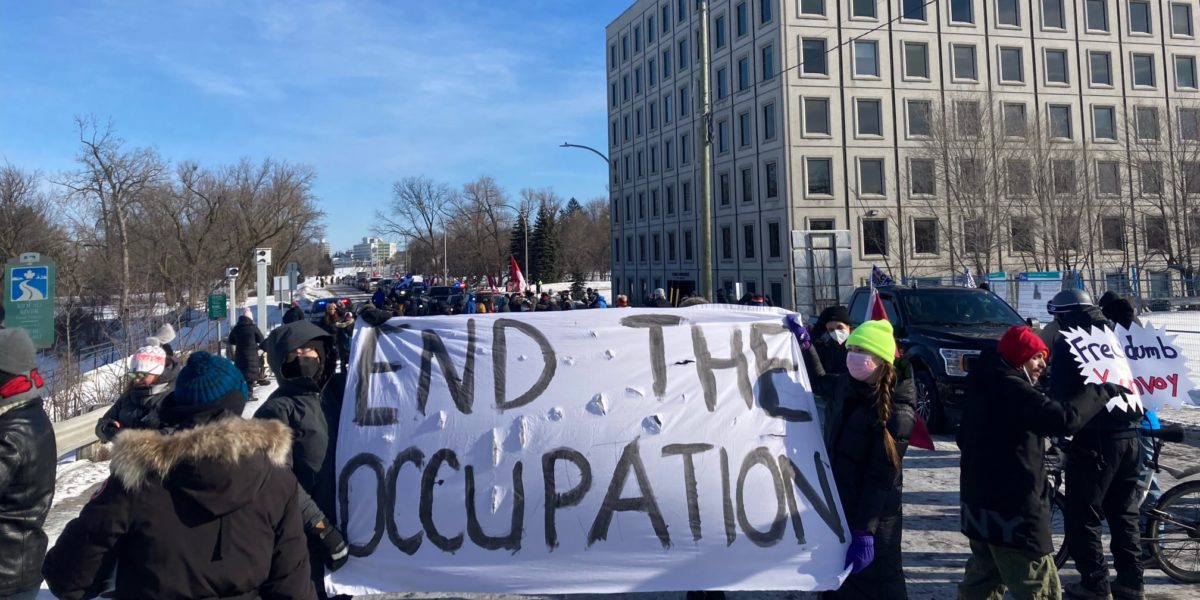One year after Canada’s capital was home to an unprecedented occupation that threatened the country’s democracy, a new report is issuing more than two dozen recommendations to prevent future so-called ‘freedom convoys.’
The report, issued by the Ottawa People’s Commission on the Convoy Occupation (OPC), offered a scathing critique not just of the occupation itself, but also of the failures of city officials to intervene.
For commissioner Debbie Owusu-Akyeeah, the occupation represented a clear failure in leadership to protect the residents of downtown Ottawa.
In a statement, Owusu-Akyeeah noted community groups who have been fighting for basic human rights have been sounding the alarm on these failures for years.
“It shouldn’t have taken a month-long occupation for those in power to listen and fully understand the consequences of not engaging the community meaningfully,” Owusu-Akyeeah said, adding the OPC’s recommendations must be “immediately implemented to ensure trust can be rebuilt.”
Fellow commissioner Leilani Farha agrees.
She criticized the City of Ottawa, the provincial government, and the police for failing to predict the significant harm that an occupation of the capital’s downtown core would have on the most vulnerable communities.
Farha defined those communities as people with disabilities, those on low-income, and unhoused people.
“Unless and until socio-economic rights to adequate housing, food, health care, social services, and an adequate standard of living are taken seriously by governments, it’s unlikely these groups will fare any better during the next crisis,” Farha said in a statement.
Commissioner Monia Mazigh, who spoke with rabble.ca after the OPC released the first edition of their report in January, expressed disappointment that no officials have taken responsibility or apologized for their failures in responding to the occupation.
Mazigh pointed out that it took 10 days for a state of emergency to be issued. By the time it was declared, the damage was done.
READ MORE: Commission concludes Ottawa ‘freedom convoy’ was an occupation
In addition to the delayed response of the government, Mazigh noted that neither law enforcement or city officials dispatched available officers to do wellness checks on vulnerable residents. After all, the downtown core of Ottawa was locked down, preventing people from accessing basic necessities like food, shelter and prescription medication.
“These are some examples of what needs to be changed in order to move forward and build trust with the community,” Mazigh said.
The events of the 2022 Ottawa occupation may be in the rear view for some, but commissioner Alex Neve warns Canadians can’t forget about the damage done.
“The last thing governments can do now, 14 months after the convoy occupation, is pretend that all is fine, lessons have been learned and it is time to move on,” Neve said. “This experience has laid bare much that is broken in Ottawa, which no doubt resonates in other cities as well.”
Key takeaways are accountability and trust
The key components of the commissioners’ recommendations focus on taking accountability, rebuilding trust with communities, and implementing multi-faceted safeguards to prevent future anti-democratic occupations of the nation’s capital.
The commissioners have called on the city of Ottawa, along with the provincial and federal governments, to issue “meaningful apologies” to residents, while “collectively ensur[ing] that affected residents, workers and business owners receive full redress” for any harms suffered during the __-day event.
The report indicates the forms of redress must come in the form of compensation for lost wages and income, as well as expenses like mental health treatment during and after the occupation.
Additionally, the commissioners are calling for an independent investigation to explain why police and bylaw officials failed to enforce a series of laws that could have prevented a blockade altogether.
A citizen-led emergency committee is needed
On a local level, the report calls for the creation of a citizen-led Emergency Advisory Committee, who would help advocate for the most vulnerable residents of the city.
That committee is crucial, the commissioners argue, to help develop structures and protocols to help maintain vital community services like health programs, public transportation booking, and crisis response teams, in the event of an emergency that forces the city to lock down.
Town hall sessions are also being recommended to allow local residents the opportunity to share their experience with city officials face-to-face, along with ideas on how to prevent future occupations in the capital.
In an effort to rebuild community trust, the report calls for the introduction of a Human Rights Charter for the City of Ottawa that would protect civil, cultural, economic, political and social rights of residents. The charter would also make clear the responsibilities and obligations of municipal officials with an independent oversight body.
Ultimately, the report provides a convincing argument for all levels of government to address the variety of hate-motivated acts and expressions associated with the occupation. These include “racism, misogyny, homophobia, transphobia, antisemitism, Islamophobia, and other hate and discrimination.”
The report encompasses testimony from 14 hearings and eight community meetings, along with testimony from over 200 people and organizations, including more than 85 written submissions.



